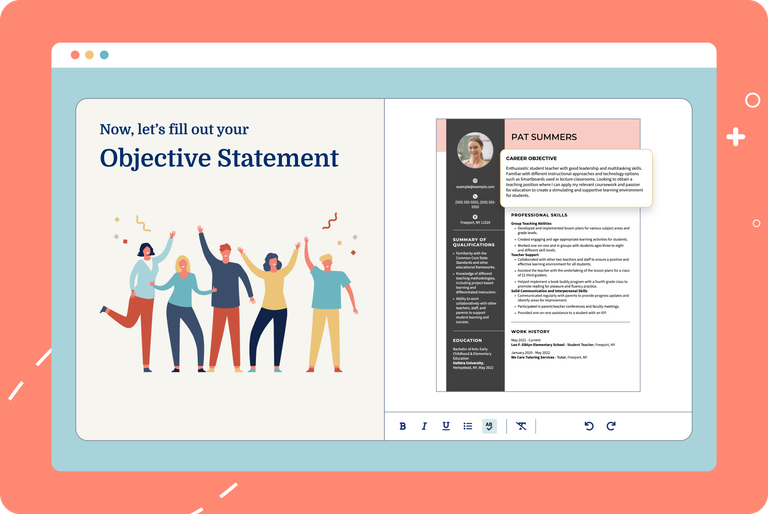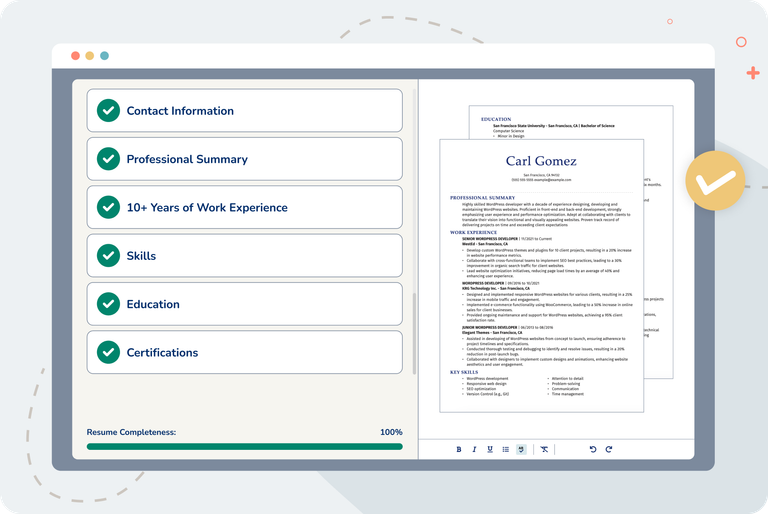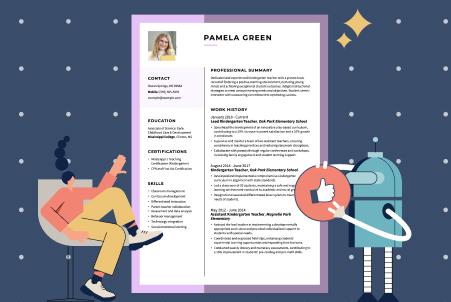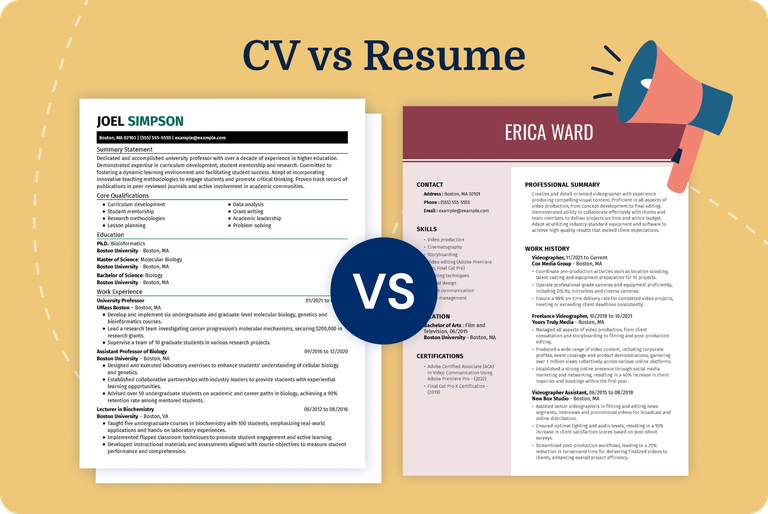Table of Contents
Get started with MyPerfectResume today!
- Build a resume on any device
- Pick an ATS-friendly template
- Tailor with AI copy suggestions
Why this resume works
- Highlights industry-specific skills: The applicant’s roles in reporting breaking news and developing social issue features reflect deep industry-specific skills essential for impactful journalism.
- Quantifies accomplishments: Increasing readership by 20% and authoring over 150 articles annually showcases the applicant’s ability to drive measurable results.
- Uses action-oriented language: Using action verbs like “increased,” “reported,” and “developed” in their work experience demonstrates initiative and effectiveness.
More Journalist Resume Examples
Explore our journalist resume examples to see how to effectively highlight your storytelling skills and media experience. Use these samples as guidance for crafting a resume that capture your unique voice and appeal to editors.
Entry-level journalist
Why this resume works
- Effective use of keywords: Incorporating keywords like “SEO Optimization” and “Digital Journalism” helps this resume pass the ATS, improving their chances of getting seen by a recruiter.
- Puts skills at the forefront: By prioritizing skills such as investigative reporting and content strategy, the resume adopts a skills-based format that highlights the competencies necessary for early career applicants.
- Places contact information prominently: A professional resume header is essential for callbacks, providing quick access to contact information and establishing credibility right from the start.
Mid-level journalist
Why this resume works
- Points to measurable outcomes: By increasing article engagement by 15% and boosting reach by 30%, the applicant shows a knack for achieving tangible progress in media visibility.
- Sections are well-organized: Effective use of bullet points and headers makes the resume easy to scan, ensuring key achievements are quickly accessible and improving readability.
- Includes a mix of soft and hard skills: Combining SEO prowess with strong interpersonal skills, the applicant balances audience engagement strategies with effective team coordination.
Experienced journalist
Why this resume works
- Showcases impressive accomplishments: By highlighting accomplishments like increasing article engagement by 30% and authoring a book, the applicant signals senior-level performance with impactful results.
- Focuses on work history: The applicant’s chronological resume format effectively showcases a robust career journey, detailing each position held and the extensive contributions made along the way.
- Emphasizes leadership skills: Managing a team of 10 to optimize publication quality clearly illustrates the applicant’s leadership skills, demonstrating capability in steering projects and improving team performance.
Journalist Resume Template (Text Version)
Aiko Kim
Chicago, IL 60610
(555)555-5555
Aiko.Kim@example.com
Professional Summary
Dynamic journalist with four years of experience. Expert in investigative reporting and SEO-optimized content creation. Award-winning storyteller dedicated to accuracy and engagement.
Work History
Journalist
City Herald Daily – Chicago, IL
January 2023 – June 2025
- Increased readership by 20% with engaging content
- Reported breaking news stories with accuracy
- Developed in-depth features on social issues
News Writer
Metro News Network – Springfield, IL
January 2021 – December 2022
- Authored over 150 news articles annually
- Enhanced SEO with keyword optimization
- Conducted interviews with experts in the field
Editorial Assistant
Daily Times – Chicago, IL
January 2020 – December 2020
- Assisted in editing for a weekly column
- Administered content planning and logistics
- Coordinated press releases and public events
Languages
- Spanish – Beginner (A1)
- French – Intermediate (B1)
- German – Beginner (A1)
Skills
- Investigative reporting
- Content creation
- SEO optimization
- Copyediting
- Social media engagement
- Interviewing techniques
- Deadline management
- Feature writing
Certifications
- Certified Professional Journalist – National Journalism Association
- SEO Specialist Certification – Search Engine Academy
Education
Master of Journalism Journalism
Columbia University New York, NY
May 2020
Bachelor of Arts Mass Communication
University of California, Berkeley Berkeley, CA
June 2018
Related Resume Guides
Advice for Writing Your Journalist Resume
Learn how to write a resume for a journalist position and discover how to highlight your storytelling skills, media savviness, and knack for uncovering the truth. Uncover job-specific advice tailored just for you.

Showcase your portfolio or projects
A portfolio or project showcase is important for a journalist because it provides tangible proof of your writing skills and storytelling abilities. It allows potential employers to see the quality and range of your work, from news articles to feature stories.
Linking to an online portfolio, such as a personal website, or including select projects in your resume can give hiring managers a clear idea of your skills.
When showcasing your work, consider including freelance projects, academic assignments, and even side projects. Structure these entries like job experiences by listing the project name, client or company (if applicable), a brief description, and your key contributions along with their impact.
For example: “Investigative Report on Local Water Quality,” completed for The Daily News; conducted in-depth research and interviews leading to policy changes in local water management. This approach helps demonstrate not just what you’ve done but also the results of your efforts.
Highlighting diverse types of work shows versatility and adaptability—key traits for any journalist. Whether through long-form journalism pieces or quick news updates, each project should reflect your ability to engage readers and communicate effectively.
Make sure your portfolio is easy to access and navigate so employers can quickly find examples that best represent your skills.
Example of a projects section
Investigative Reporting on Environmental Issues
The Green Gazette
March 2023 – June 2023
- Conducted in-depth research and interviews that exposed illegal dumping practices affecting local communities.
- Published a series of articles that led to policy changes and increased awareness among residents.
- Collaborated with photographers and videographers to create compelling multimedia content.
Feature Story on Urban Development Challenges
City Pulse Magazine
September 2022 – November 2022
- Explored the impact of rapid urbanization on housing affordability through comprehensive reporting.
- Engaged with policymakers, activists, and residents to provide diverse perspectives in the narrative.
- Used data visualization tools to present complex statistics in an accessible format.
Looking for ideas to make your resume stand out? Check out our professional resume examples to see how others show off their skills and achievements.
Emphasize your most relevant skills
In a journalist role, it’s important to show both technical and soft skills. Technical skills might include knowing how to use software like Adobe InDesign or WordPress, while soft skills could be great communication and being good at meeting deadlines.
Adding a skills section in your resume helps show these abilities clearly. It’s also a good idea to mention any artistic talents you have, like photography or video editing, as they can make your work stand out.
Make sure to weave these skills into your job descriptions too. For example, instead of just saying you wrote articles, you could say you used SEO techniques to write articles that increased web traffic by 20%.
This not only shows what you did but also how well you did it. Mixing in both types of skills in this way makes your experience more impressive and relevant for a potential employer.
For journalists, choose a resume format that highlights your writing experience, published works, and adaptability in various media outlets.
Choose a professional resume template
When choosing a resume template for a journalist, it’s key to find one that balances creativity and professionalism. A clean, structured design will help showcase your skills and experience without overwhelming the reader with too many graphics or colors.
Look for templates with a clear visual hierarchy, using headings and spacing to guide the reader’s eye through your accomplishments.
It’s also smart to pick a format that’s optimized for applicant tracking systems (ATS). Many companies use these systems to screen resumes before they reach human eyes, so sticking to simple layouts with standard fonts can ensure your resume gets seen. Avoid overly decorative elements that could confuse ATS software. Instead, focus on readability and clarity.
Finally, think about how well the template highlights your writing skills and experiences relevant to journalism. Choose one that lets you present your work history, writing samples, or projects in an organized way.
This approach shows potential employers that you’re both creative and detail-oriented—a great mix for any journalist.
Try the Resume Builder to quickly create a reporter’s resume that stands out. It offers templates that make organizing your writing skills and stories easy!
Format your resume properly
Properly formatting your resume is key for readability and professional appeal. For a journalist, the chronological resume format often works best. It allows you to showcase consistent career progress and experience in reporting, writing, or editing. If you have lots of experience, listing jobs from newest to oldest highlights your growth and accomplishments over time.
5 resume formatting tips
- Structure with clear headings: Use distinct section headings like “Work Experience,” “Skills,” and “Portfolio” for clarity.
- Choose consistent fonts: Select easy-to-read fonts like Arial or Calibri to maintain uniformity and readability.
- Incorporate bullet points: List skills and experiences in bullet points to improve scanning efficiency.
- Keep it concise: Limit the resume to one page unless you have significant experience to showcase.
- Ensure proper alignment: Maintain consistent spacing and alignment for a clean, professional presentation.
Applying for jobs online? Our ATS Resume Checker helps you find formatting slips, missing keywords, and layout problems, so your resume gets noticed by hiring managers.
Salary Insights for Journalists
Understanding salary data can help you make smart choices about your career path or help you decide where to move if you’re thinking about moving you career elsewhere. More details are provided below from the U.S. Bureau of Labor Statistics.
Top 10 highest-paying states for journalists
Journalists earn varying salaries across the United States, with a national average of $69,123. The table below highlights the states where journalists command the highest compensation.
Our salary information comes from the U.S. Bureau of Labor Statistics’ Occupational Employment and Wage Statistics survey. This official government data provides the most comprehensive and reliable salary information for writers across all 50 states and the District of Columbia.
The figures presented here reflect the May 2025 dataset, which is the most recent available as of this publication.
| State | Average Salary |
|---|---|
| New York | $293,430 |
| District of Columbia | $171,300 |
| California | $119,420 |
| Connecticut | $106,490 |
| Georgia | $89,690 |
| Illinois | $84,460 |
| Nevada | $81,990 |
| Massachusetts | $78,210 |
| Tennessee | $77,030 |
| New Jersey | $77,100 |
FAQ
Do I need to include a cover letter with my journalist resume?
Yes, including a cover letter with your journalist resume is highly recommended because it can help you stand out from other applicants.
A cover letter gives you an opportunity to demonstrate your knowledge of the publication or media outlet and explain why you’re particularly excited about working there.
Additionally, a well-crafted cover letter shows attention to detail and ability to communicate effectively, both important traits for a journalist.
You might consider using the Cover Letter Generator, which lets you highlight your unique storytelling skills and passion for journalism that may not be fully captured in your resume.
You can also refer to cover letter examples to see how to discuss specific stories or articles you’ve written that are relevant to the job you’re applying for.
How long should a journalist’s resume be?
For a journalist, a one-page resume typically works best, especially if you’re early in your career. This length allows you to highlight key skills like writing, research abilities, and any relevant experience with publications or media outlets.
If you’ve accumulated more extensive experience or have several notable achievements, extending to a two-page resume is acceptable. Just ensure every detail adds value and relevance to the roles you’re targeting.
Explore our guide on how long a resume should be for examples and tips specific to different career stages.
How do you write a journalist resume with no experience?
Crafting a journalist resume without direct experience involves focusing on your skills, education, and any relevant activities that demonstrate your potential. For guidance on how to create a resume with no experience, consider these strategies:
- Focus on education: Start with your degree in journalism or related fields like communication or English. Note any relevant coursework, projects, or honors that demonstrate your understanding of media principles.
- Highlight writing abilities: Include any writing you’ve done outside of formal employment, such as blogs, student publications, or volunteer work. Showcasing diverse writing samples can illustrate versatility and voice.
- Leverage transferable skills: Emphasize skills useful to journalism like research skill, interviewing techniques, storytelling ability, and digital literacy. These can be acquired through academic projects or other roles.
- Include internships and extracurriculars: If you’ve interned at a media company or participated in clubs related to journalism (like a college newspaper), list these experiences as they often involve practical duties akin to professional work.
Look into resources on entry-level resumes for journalists to find more detailed examples and tailored advice.
Rate this article
Journalist
Share this page
Additional Resources

The Illusion of Wage Growth: Where Paychecks Stretch the Farthest
U.S. wages have climbed at one of the fastest rates in modern history. Between 2020 and 2024, the average American worker’s pay rose from about $64,000 to $75,600, an 18%

100+ Resume Objective Statement Examples & Best Practices
In just a sentence or two, a resume objective statement tells hiring managers the role or career path you’re aiming for and the unique skills and value you bring to

150+ Skills for a Resume: Examples for Any Job
Crafting a standout resume starts with highlighting the skills and qualifications that demonstrate your fit for the role. But in a crowded job market, knowing which abilities will actually catch

When to Use a Two Page Resume (With Examples & Formatting Tips)
If you’ve spent years building your skills, growing in your career, and racking up accomplishments, a one-page resume might not cut it. A two-page resume gives you space to present a

How to Make an ATS Friendly Resume (Templates & Guide)
In today’s fast-paced hiring climate, many employers use applicant tracking systems (ATS) to organize, store, and screen candidate information. Optimizing your resume for ATS is essential for ensuring your application passes

CV vs Resume: What’s The Difference?
Confused about the difference between a resume and a CV? You’re not alone! While both documents help you land a job, they vary in content, structure, and formatting. In this guide, we’ll
